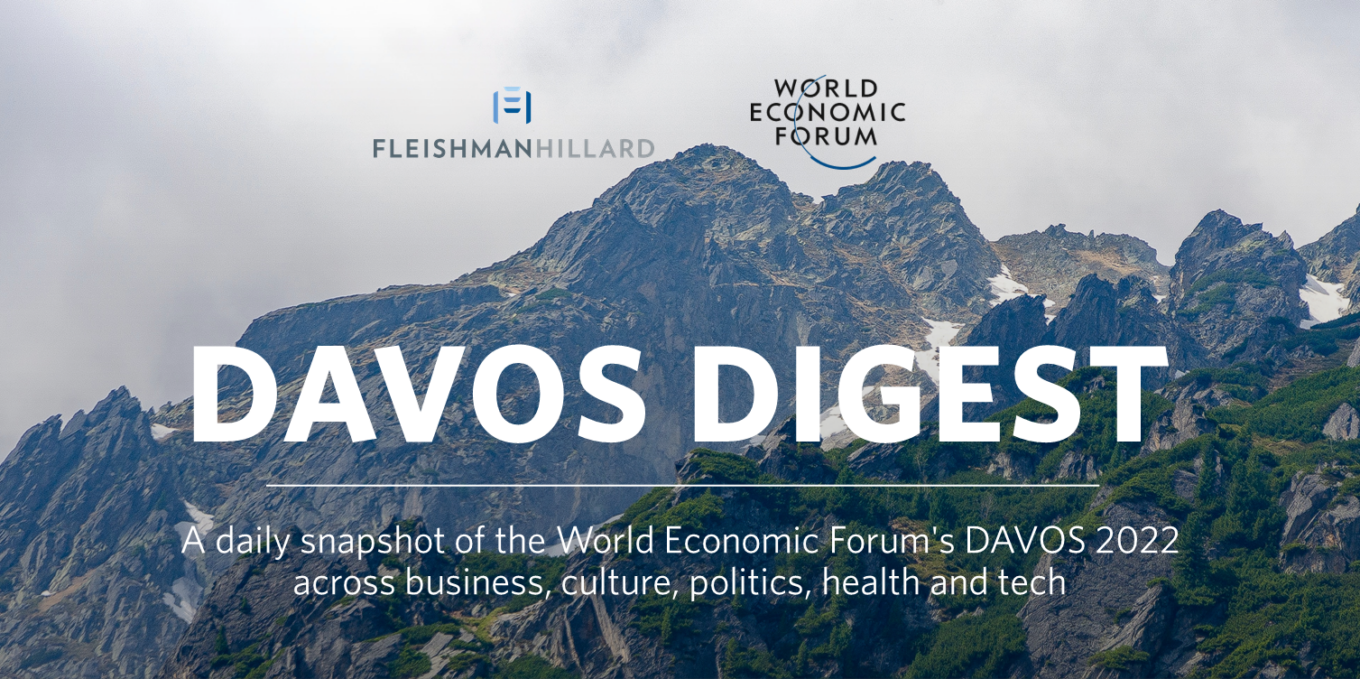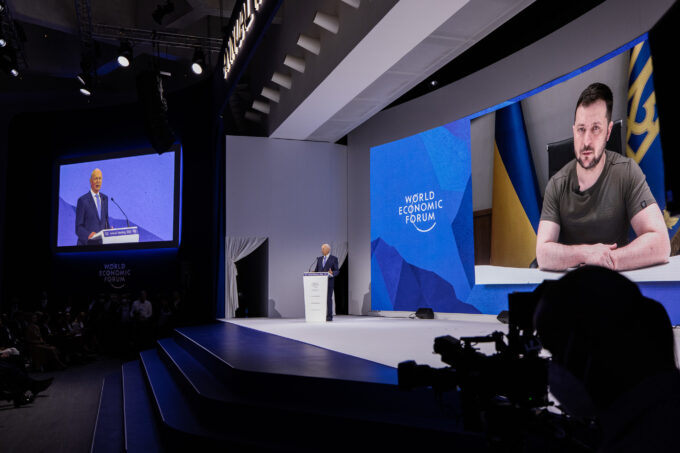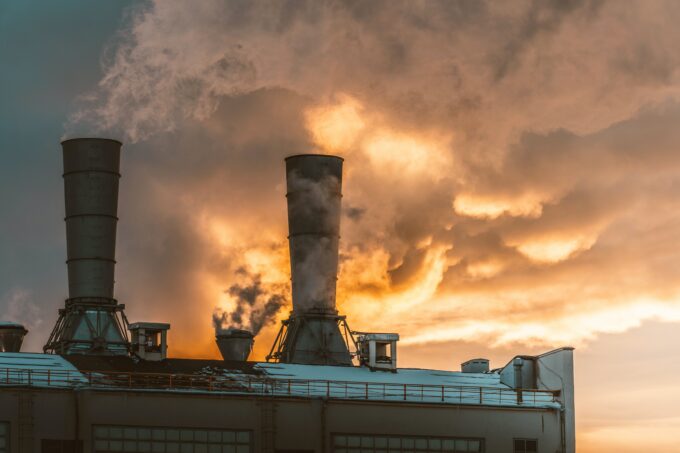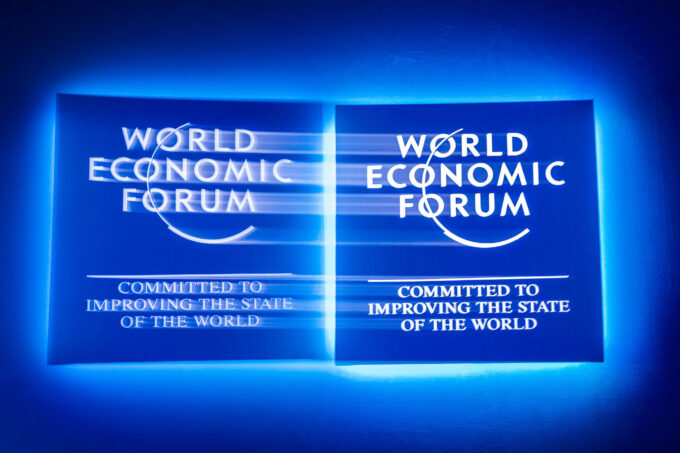FleishmanHillard Davos Digest 2022: Day 1

Davos Digest 2022: Day One
Welcome to day one of FleishmanHillard’s Davos Digest 2022.
Much has changed in the two years since the world’s elites gathered in a Swiss mountain village to discuss the world’s biggest problems. And we’re not just talking about the seasons: cast your mind back to January 2020, the coronavirus outbreak in China was barely registering as a concern for attendees, while despite the ongoing crisis between Russia and Ukraine, the risk of escalation to war in Europe seemed low.
Fast forward to today, and the first-ever late spring Davos conference presents an entirely different global landscape. It’s fitting that this year’s meeting is centred around the theme “History at a Turning Point: Government Policies and Business Strategies”.
Of course, some things haven’t changed. This year’s Davos forum will still run largely as it always has, a combination of high-level discussions and soirees. The aim of this year’s summit is to tackle the world’s most pressing issues – climate change, wealth inequality, and geopolitical conflict following Russia’s invasion of Ukraine.
That’s a big to-do list – and it makes this year’s absences even more notable. US President Joe Biden hasn’t made it out to the Alps, while whole swathes of China’s business and technology elite have had to stay home under the country’s strict zero-Covid policy.
Other notable absences are Russian officials and business leaders, whose delegation base now hosts a Ukrainian foundation.
After last year’s hiatus, how different will Davos 2022 feel? The issues on the docket feel markedly more serious. One thing is for sure – it’s going to be a busy week. Let’s get to it.
Every day for the rest of the week we’ll be sending you the latest cross-sector developments and outcomes from Davos 2022. Here’s a quick snapshot of the news so far.
Market Meltdown | DAVOS Digest 2022
The combination of the urgent challenges raised this year has Davos 2022 being hailed as ‘the World Economic Forum’s most consequential meeting in 50 years’.

Image: World Economic Forum
History at a turning point: The theme of this year’s event was central to the address given by Ukrainian President Volodymyr Zelenskyy this morning in which he told delegates that this is “the moment when it is decided whether brute force will rule the world”. He called for “maximum sanctions” on Russia to cut off all trade with the country and weaken its oil exports and banks, arguing that if this force was not stopped then these annual diplomatic meetings would be rendered meaningless. The conflict’s prominence on this year’s agenda and the renewed plea from Zelenskyy for business leaders to pull out of Russia could lead to extra pressure on corporations (especially those participating at Davos 2022) to withdraw if they haven’t already done so already.
The Domino effect: With the world facing a series of crises, delegates at today’s sessions have been keen to stress the importance of global cooperation and a considered approach as both companies and countries respond. Germany’s Vice-Chancellor Robert Habeck highlighted this attitude, arguing: “We have to solve one problem with the solution of another,” while India’s Minister of Petroleum and Natural Gas Hardeep Singh Puri emphasised the importance of navigating Ukraine and the energy crisis without worsening the climate crisis. In an ever–closer world, global challenges should not be looked at in isolation, and states must be careful to assess any chain reaction that their policies may cause.
Looking ahead in politics: Tomorrow, the delegates will hear a Special Address from both Jens Stoltenburg, Secretary General of NATO, and Ursula von der Leyen, President of the European Commission. With this week marking three months since the invasion was launched on 24 February, both figures are likely to be questioned on the steps that they are taking to support Ukraine and punish Russia.
World to business: can you help clean this mess up? Please…? | DAVOS Digest 2022
 Turning up the heat on fossil fuel investments: Speaking at an energy panel, Faith Birol, head of the International Energy Agency, delivered some unwelcome advice for fossil fuel companies. He said the immediate response to energy shocks from the Ukraine war should be an increase of oil and gas on the market but was quick to mention that this did not mean we should continue to invest in fossil fuel companies.
Turning up the heat on fossil fuel investments: Speaking at an energy panel, Faith Birol, head of the International Energy Agency, delivered some unwelcome advice for fossil fuel companies. He said the immediate response to energy shocks from the Ukraine war should be an increase of oil and gas on the market but was quick to mention that this did not mean we should continue to invest in fossil fuel companies.
This was countered by Occidental CEO Vicki Hollub who argued that oil and gas companies need to play a role in the transition to a cleaner energy picture. This debate looks set to rumble on throughout the forum, so watch this space.
Profiting from pain: Oxfam launched a new report, revealing how while the pandemic saw millions fall into poverty, it also resulted in an economic windfall that created a new billionaire every 30 hours. Every 30 hours. How companies that have done well out of the pandemic justify holding on to their profits made throughout the pandemic is set to be a hot topic this year, and it’s important that companies avoid hypocrisy and prepare for some probing questions about their balance sheets.
My office is better than yours: The corporate world continues to divide into businesses offering their employees ultra-flexible, work-from-tropical-island policies, and those mandating their enforced return to offices newly filled with perks to entice them back. Today, Credit Suisse CEO Thomas Gottstein shared his thoughts, saying that he does not think banks will ever return to working in the office full-time. “It’s unrealistic and it is not what employees want,” he said in an interview at Davos. “We are in a soft way trying to encourage people to come back, but it’s counterproductive if you push too hard.” Others in the financial sector, notably Goldman Sachs, beg to differ…
Ripple making waves: Crypto may be in freefall, but that didn’t stop the blockchain climbing high up the agenda at this year’s WEF, in a sign of how far the industry has come in recent years. Brad Garlinghouse grabbed the headlines today, using his panel event to pile pressure on the SEC to create a more favourable regulatory environment for crypto.
Looking ahead in business: Tomorrow there is a panel entitled, ‘Renewing a Global Social Contract’, that will be looking at the role that businesses can play in creating social mobility, jobs and equity across society.
‘Modesty in the Mountains’ | DAVOS Digest 2022

Image: World Economic Forum
If there was to be one overriding cultural and emotional theme of those in attendance on the opening day of Davos 2022, it would be one of bashfulness. At the time of the first WEF in 1987, free markets were being unleashed, with belief in their ‘invisible hand’ becoming orthodoxy, and shareholders were companies’ main priority. This year’s WEF, however, is taking place in vastly different circumstances.
On a macro level, we are witnessing a shift away from shareholder primacy towards one of stakeholder capitalism. This shift is being amplified by the immediate economic context of global inflation, the cost of living crisis, and – of course – the long shadow of COVID-19, the disease which saw us go from a society that idolised leaders and influencers to carers, experts and essential workers. All this, and more, is the important stage dressing for the biggest cultural stories of the day.
Death and more taxes… A group of millionaires – the collective noun of which we will leave our readers to decide – have joined protests at Davos demanding that governments “tax [them] now” to tackle the burgeoning gulf between rich and poor. The unusual move comes after the aforementioned Oxfam report set its sights on the windfall wealth billionaires acquired during the pandemic.
Let’s not do that again… Pandemic lessons for healthcare leaders | DAVOS Digest 2022
 Strengthening health systems post-COVID, addressing the mental health crisis, and better preparedness for future pandemics are front of mind for healthcare leaders and experts attending this year’s Davos.
Strengthening health systems post-COVID, addressing the mental health crisis, and better preparedness for future pandemics are front of mind for healthcare leaders and experts attending this year’s Davos.
Future-proofing health systems: Industry leaders including Leif Johansson, Chairman of the Board AstraZeneca, shared the lessons learned from the pandemic and the long-term value of investing in health systems to focus on prevention, rather than cure. Current data shows that 97% of health costs are spent in hospitals while patients are being ill, and just 3% is spent on trying to prevent and detect early disease. There needs to be a major shift with the aspiration of an 80/20, or a 60/40 ratio instead, he argued.
Mental health – we’re all in this together: A stellar panel including Heidi Larson, Professor of Anthropology, Risk and Decision Science, London School of Hygiene and Tropical Medicine, took to the stage to highlight the implications of the pandemic on mental health. We’re urged to think of mental health as a societal, rather than individual, phenomenon and to respond to it in a general fashion. The clear implication is that mental health, and the need to eradicate the stigma around it, is a universal priority for all and that we can save lives through individual actions we take every single day.
Looking ahead in healthcare: With the stark reminder that 80% of the world’s population lives in low- and middle-income countries, speakers will be addressing health inequity as well as the specific impact of the pandemic on the younger generation.
In tech we trust | DAVOS Digest 2022
Balancing public safety with the creep factor: It’s not the first time that discussions about trust, privacy and regulation take to the stage at Davos, but today the conversation turned to the use of AI in public services. Many businesses and governments have been quietly increasing their use of facial recognition over the past few years as a means of law enforcement: against this backdrop, ministers, academics and private businesses discussed how to maintain the trust of the public as they deploy these technologies in civic spaces.
 Cyber-insecurity: WEF’s own Global Cybersecurity Outlook calculated a 125% increase in cyberattacks globally, and evidence already suggests a continued uptick in 2022. Singapore’s Minister for Communications and Information, Josephine Teo, emphasised the importance of education, upskilling the workforce and the duty of care governments have to help their citizens stay safe online.
Cyber-insecurity: WEF’s own Global Cybersecurity Outlook calculated a 125% increase in cyberattacks globally, and evidence already suggests a continued uptick in 2022. Singapore’s Minister for Communications and Information, Josephine Teo, emphasised the importance of education, upskilling the workforce and the duty of care governments have to help their citizens stay safe online.
World still hungry for chips: Intel CEO, Pat Gelsinger stated there have been significant extensions in the delivery times of the technologies used to manufacture chips, emphasising how it is one of the major pinch points for the industry. He urged authorities to chip in and pass their own legislation to promote national semiconductor manufacturing in a bid to ease the shortages.
Looking ahead in tech: Tomorrow, the Davos 2022 tech scene turns green, with discussions on how digital innovation can help achieve net zero, with SAP CEO Christian Klein. Leaders from HP, Nokia and Google will also share their vision for the digital economy in the face of cybersecurity vulnerability, supply chain issues and geopolitical fragmentation.
Join us for more insight from Davos 2022 in tomorrow’s Davos digest.
Find Out More
-
Platinum CMS Award
March 13, 2024
-
Changing Communications Tack at Mobile World Congress
February 21, 2024


